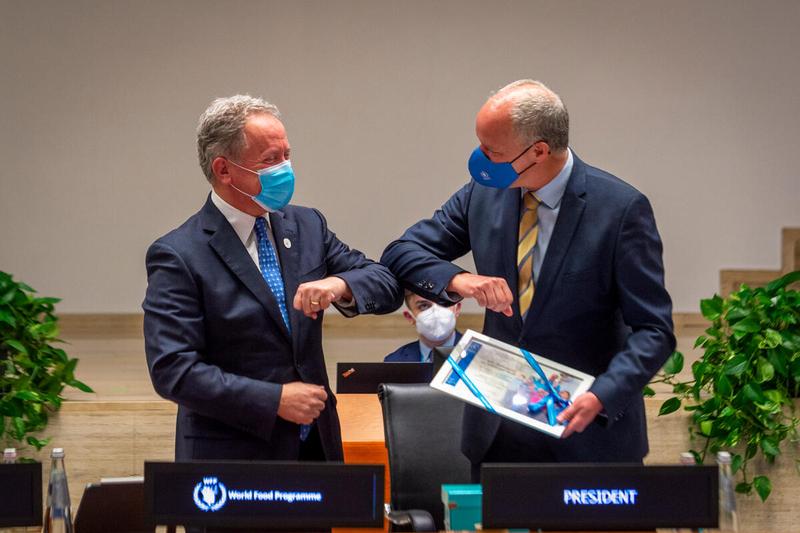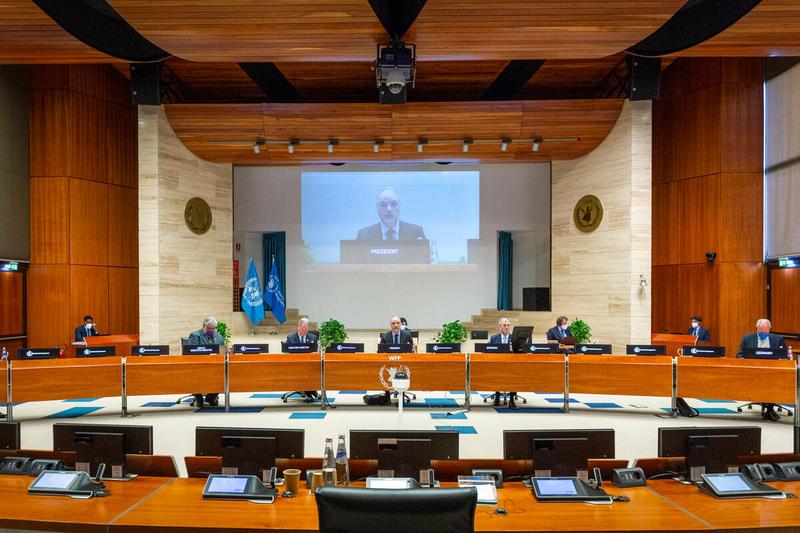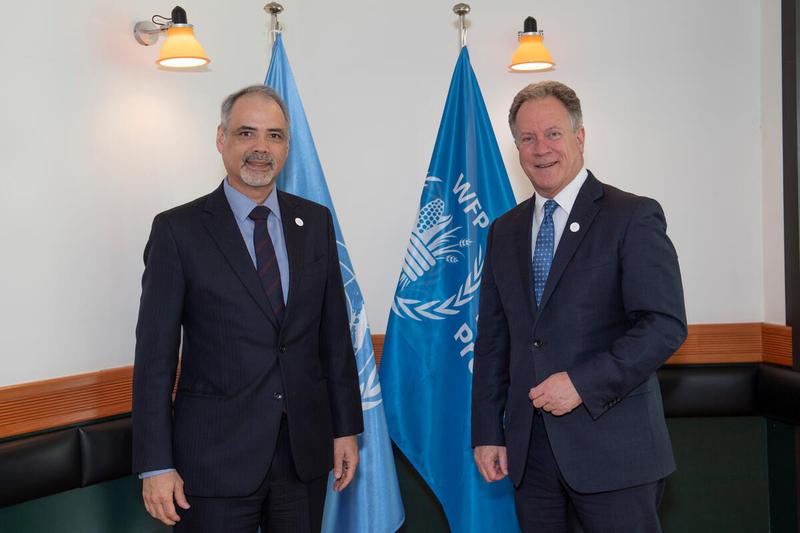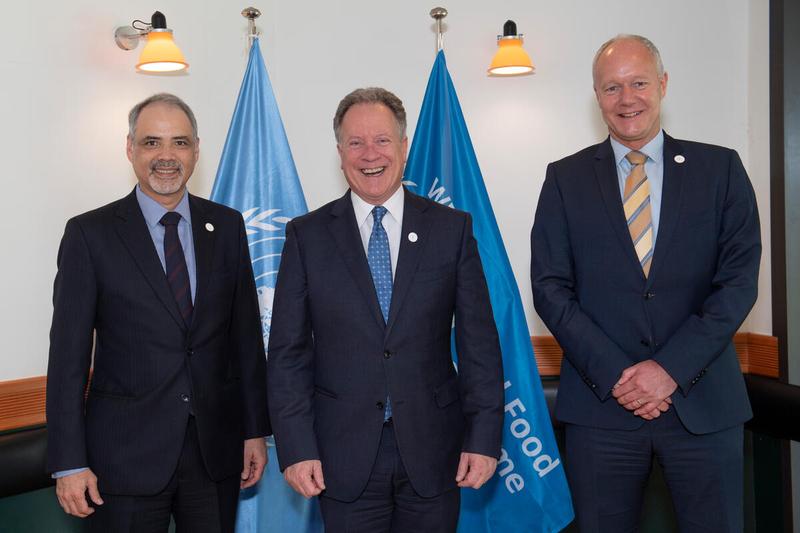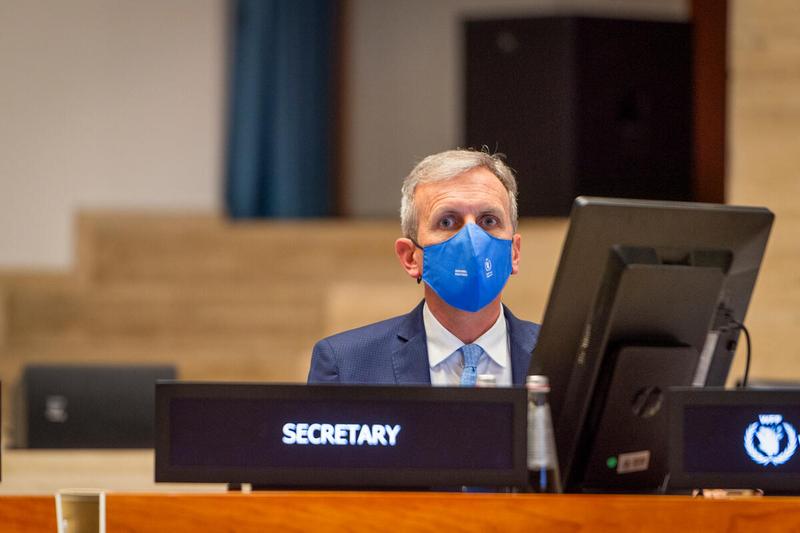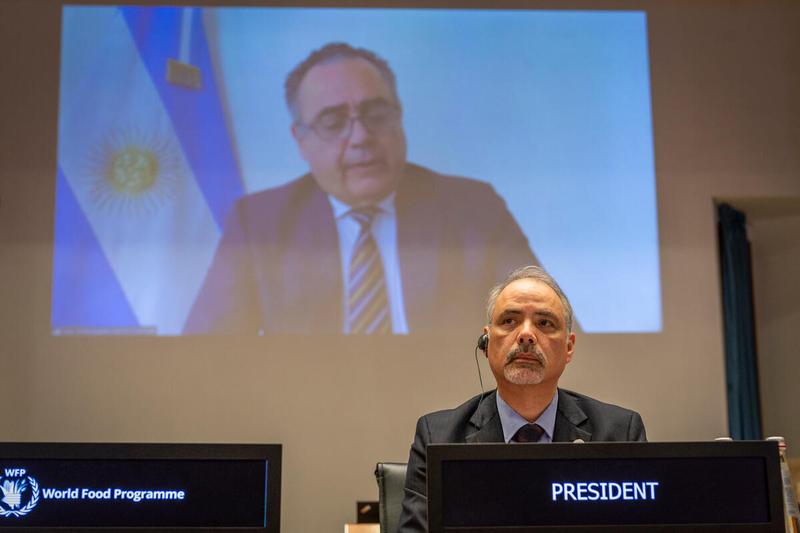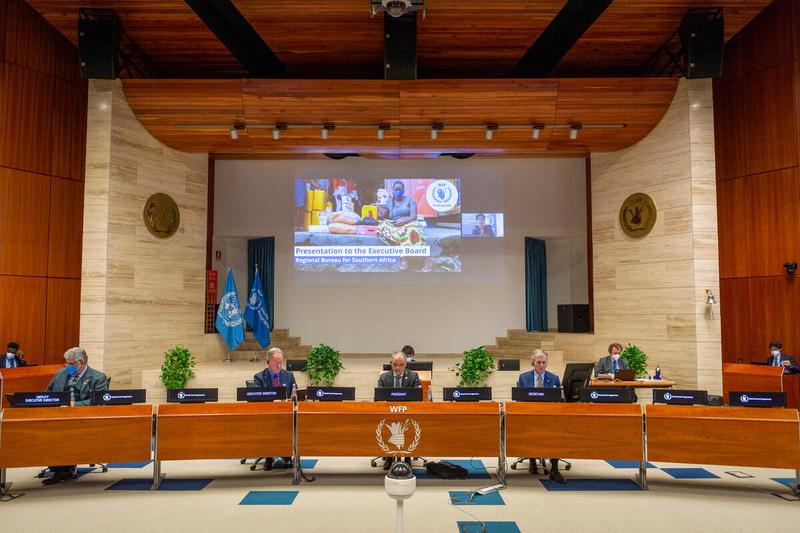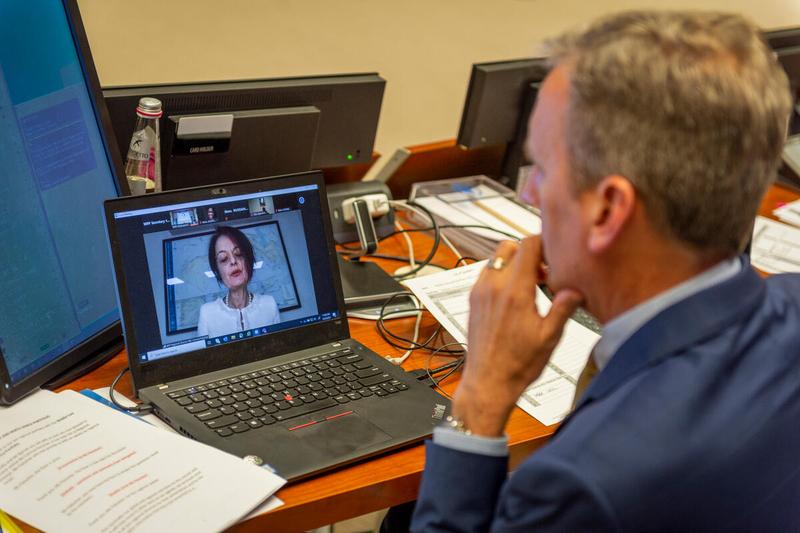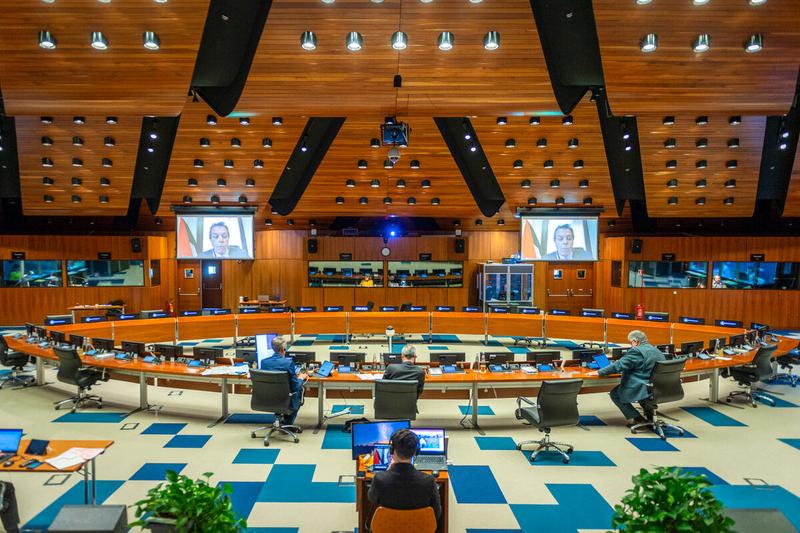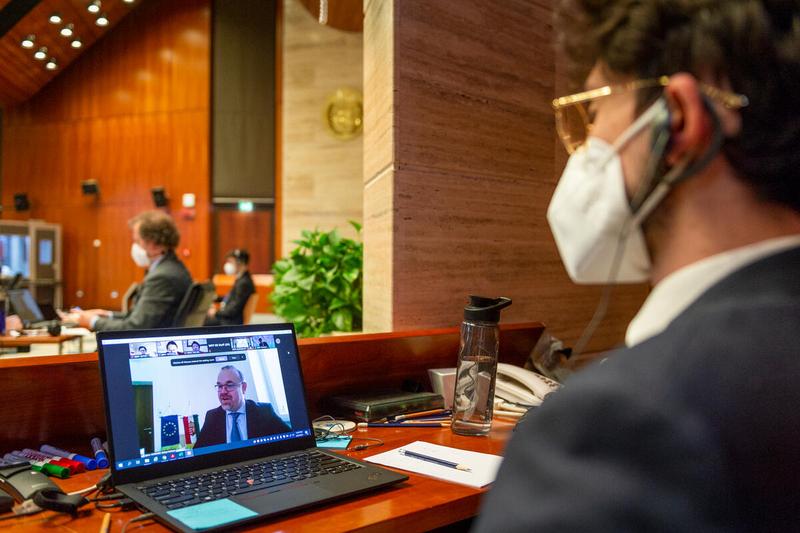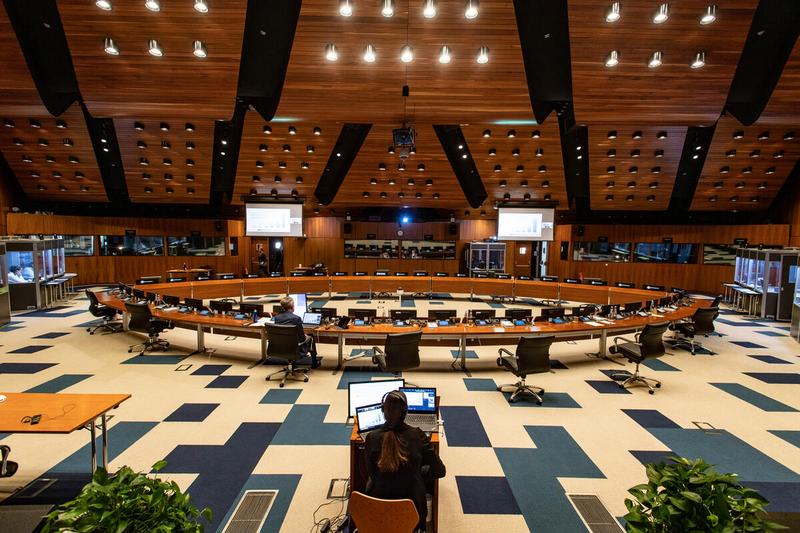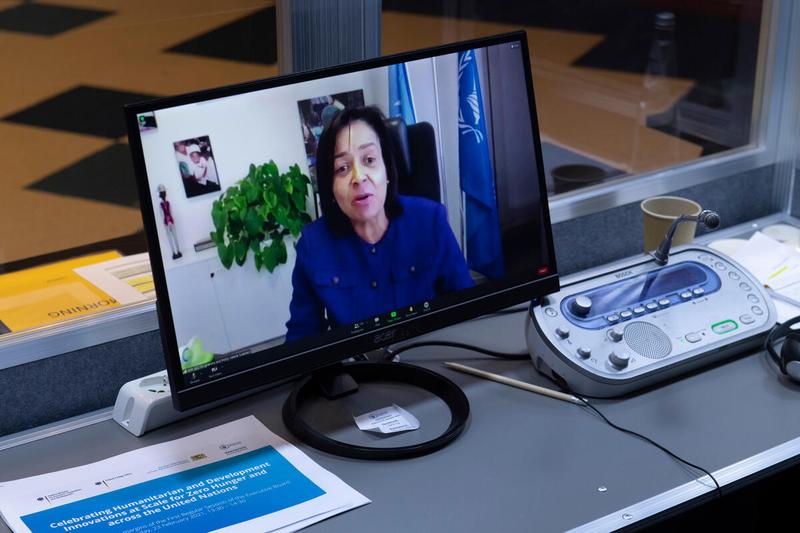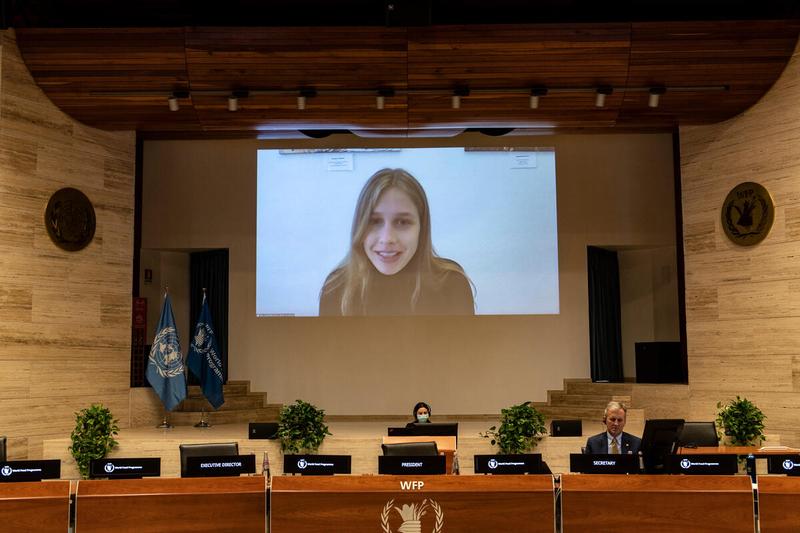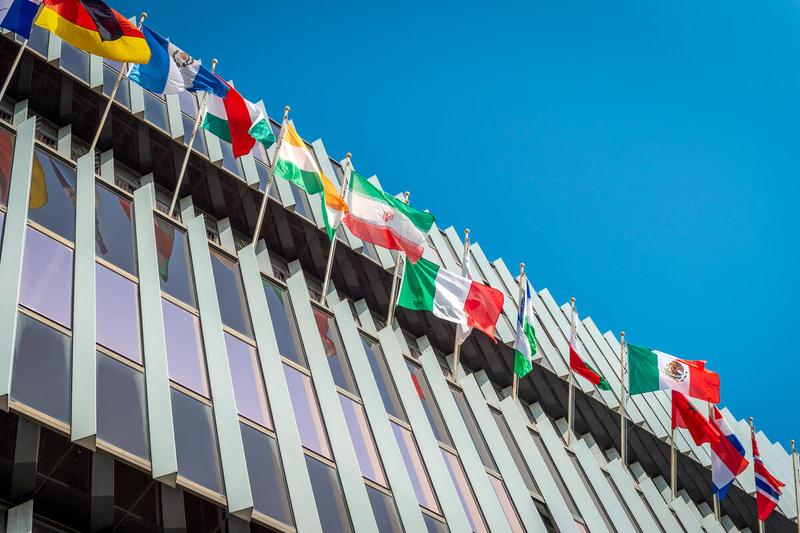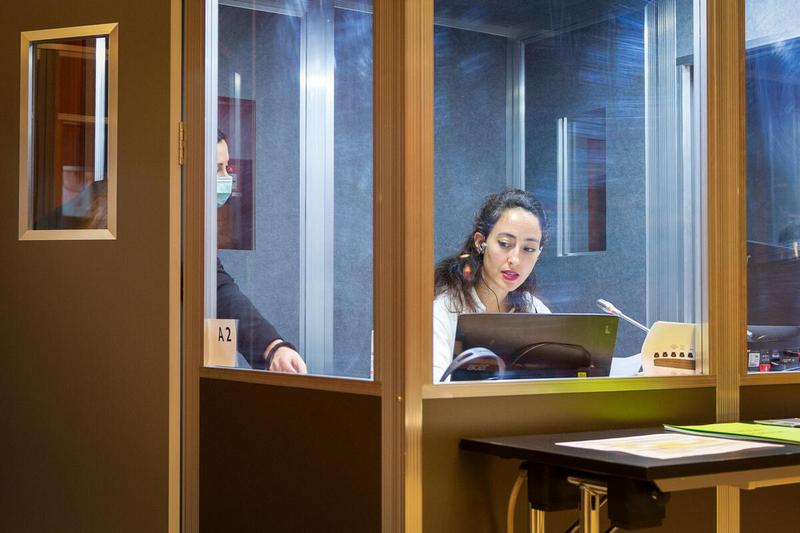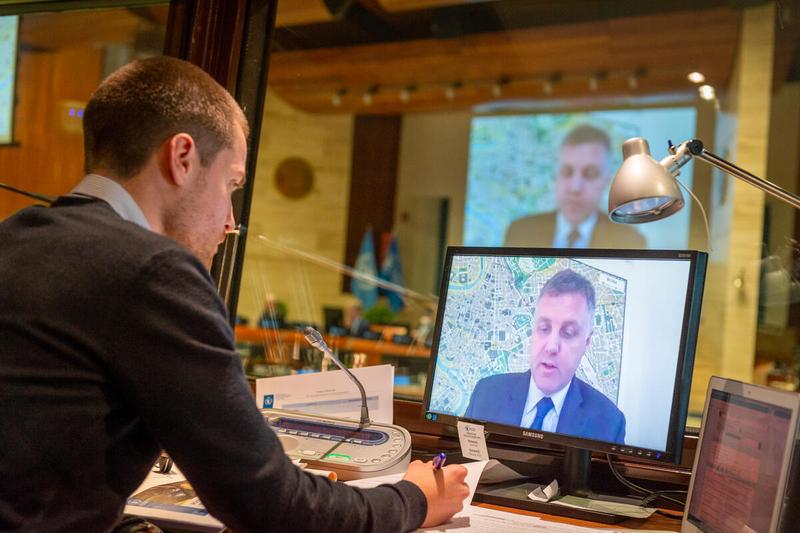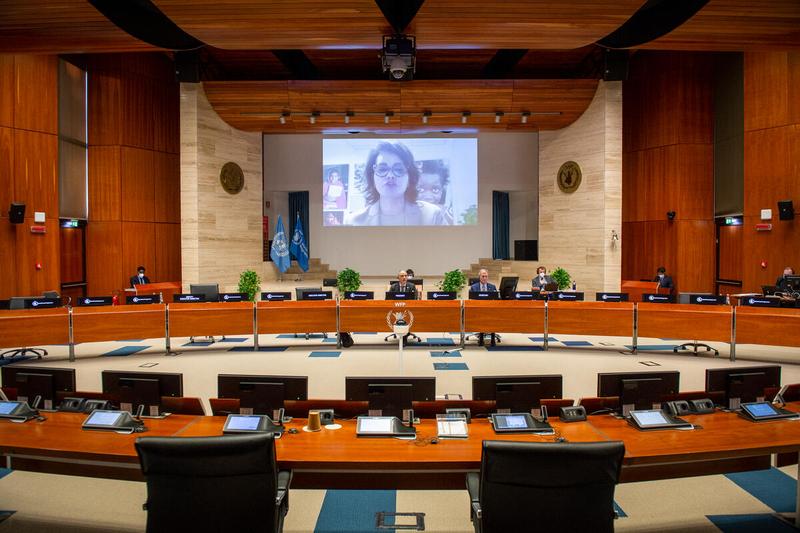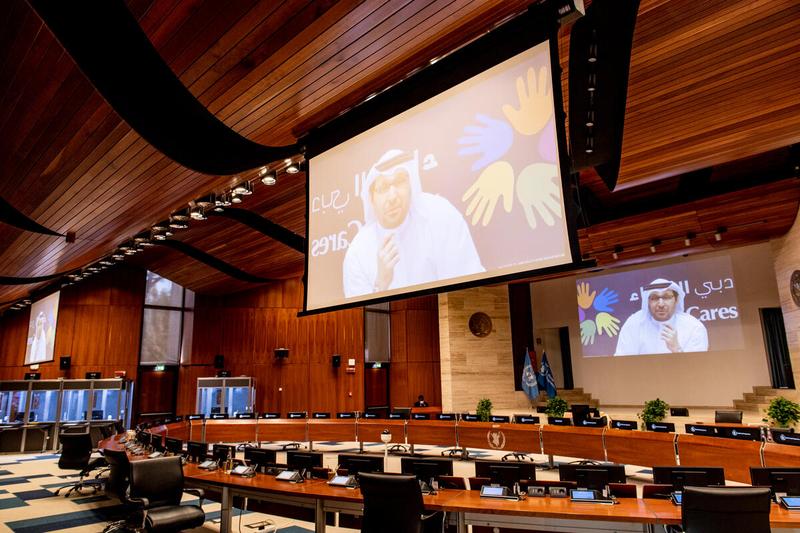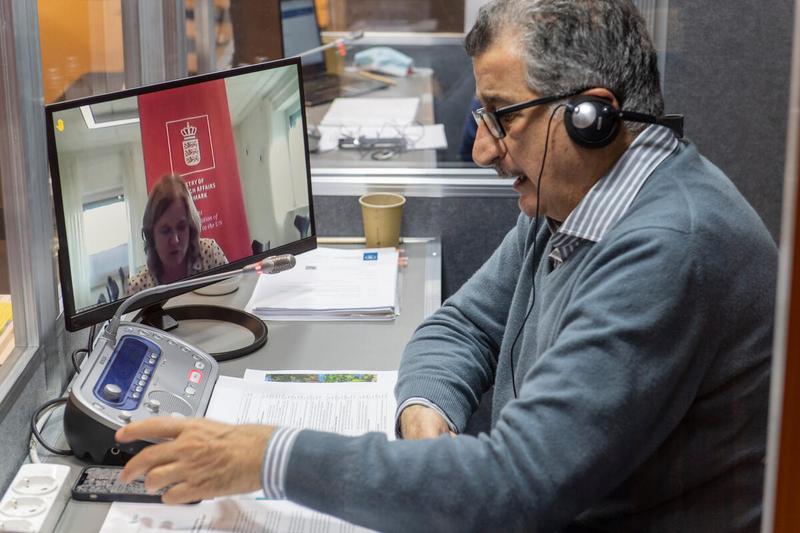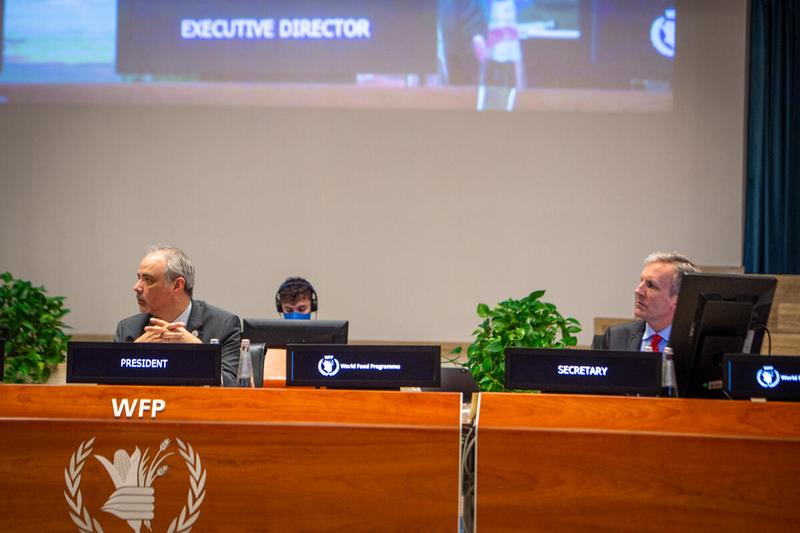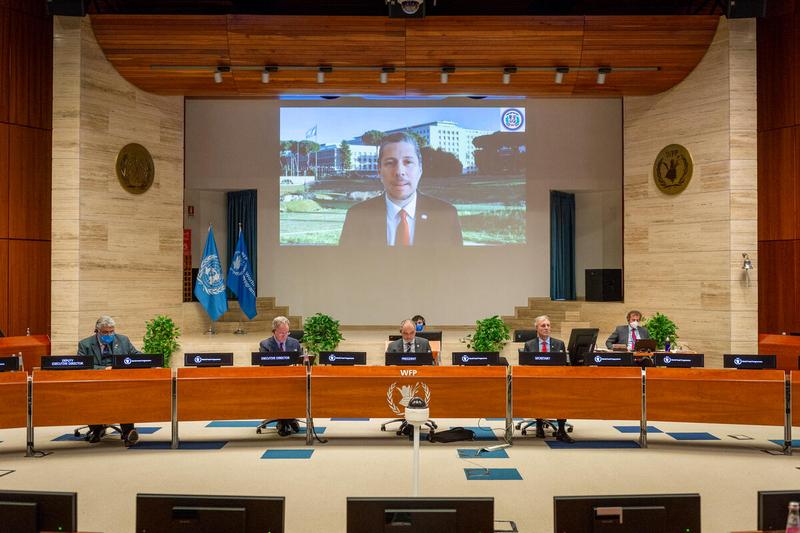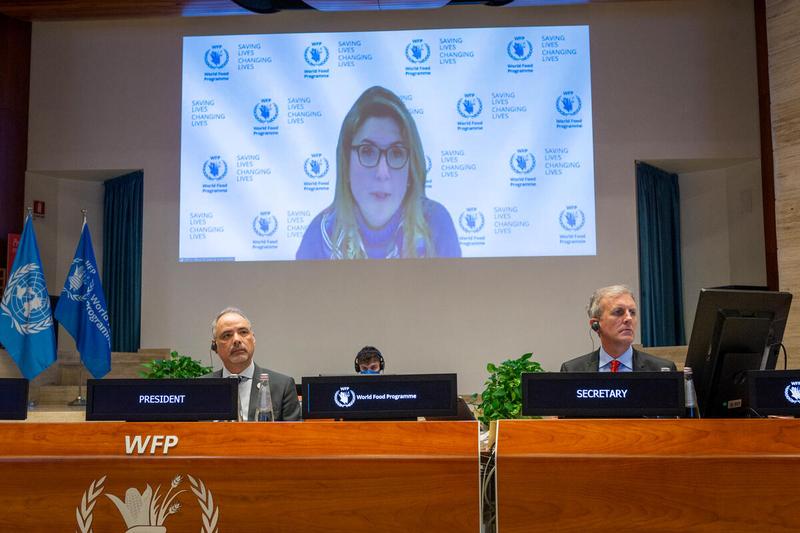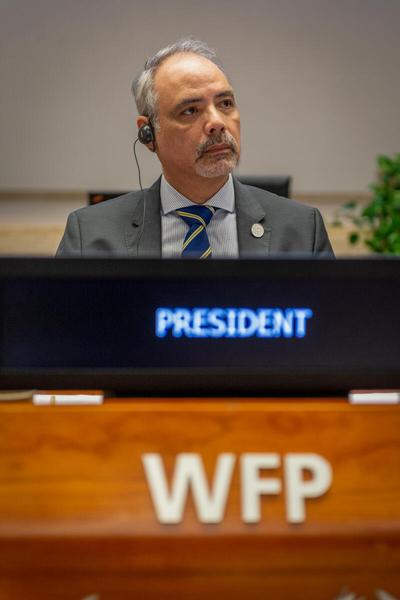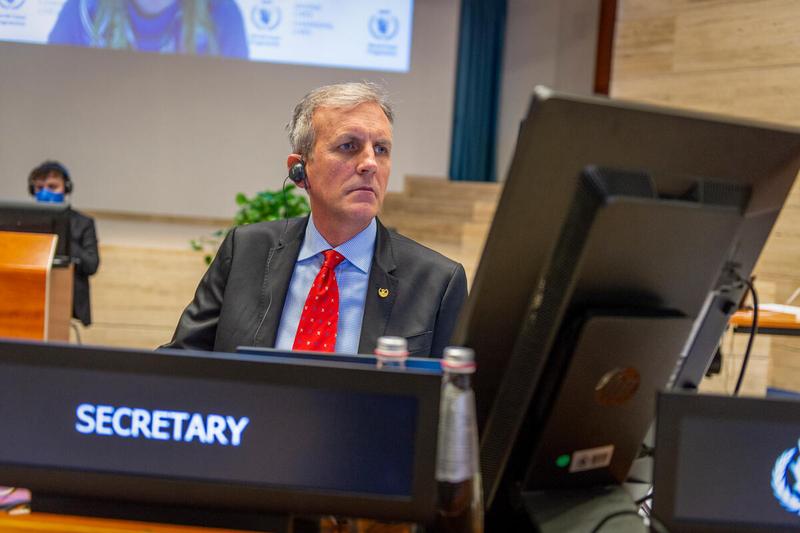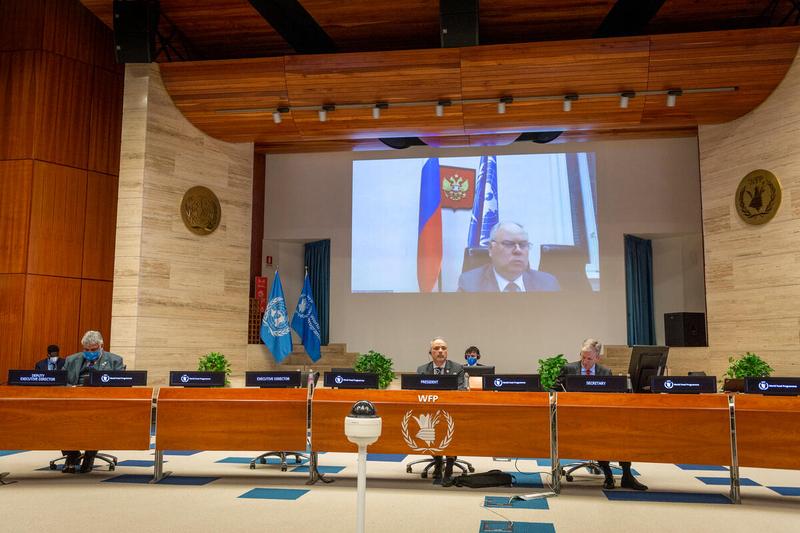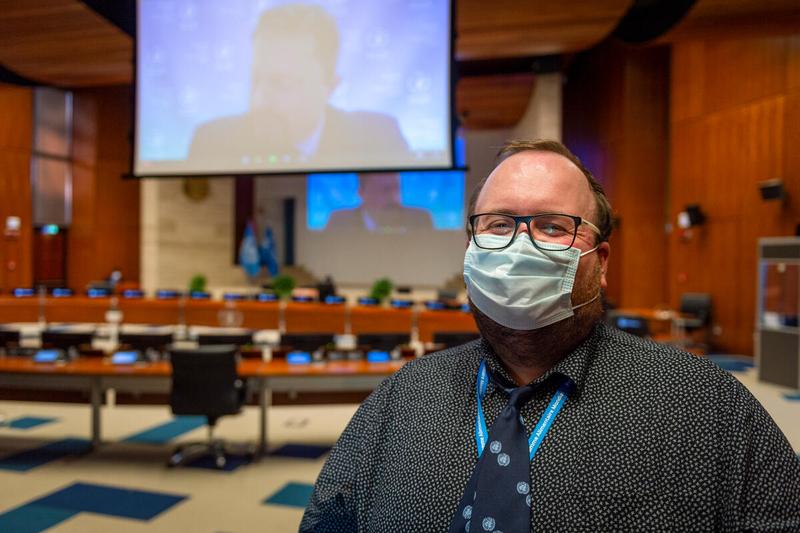On 22-24 February the World Food Programme organized another successful virtual session of the Executive Board providing the members a safe, user-friendly experience through the Zoom platform.
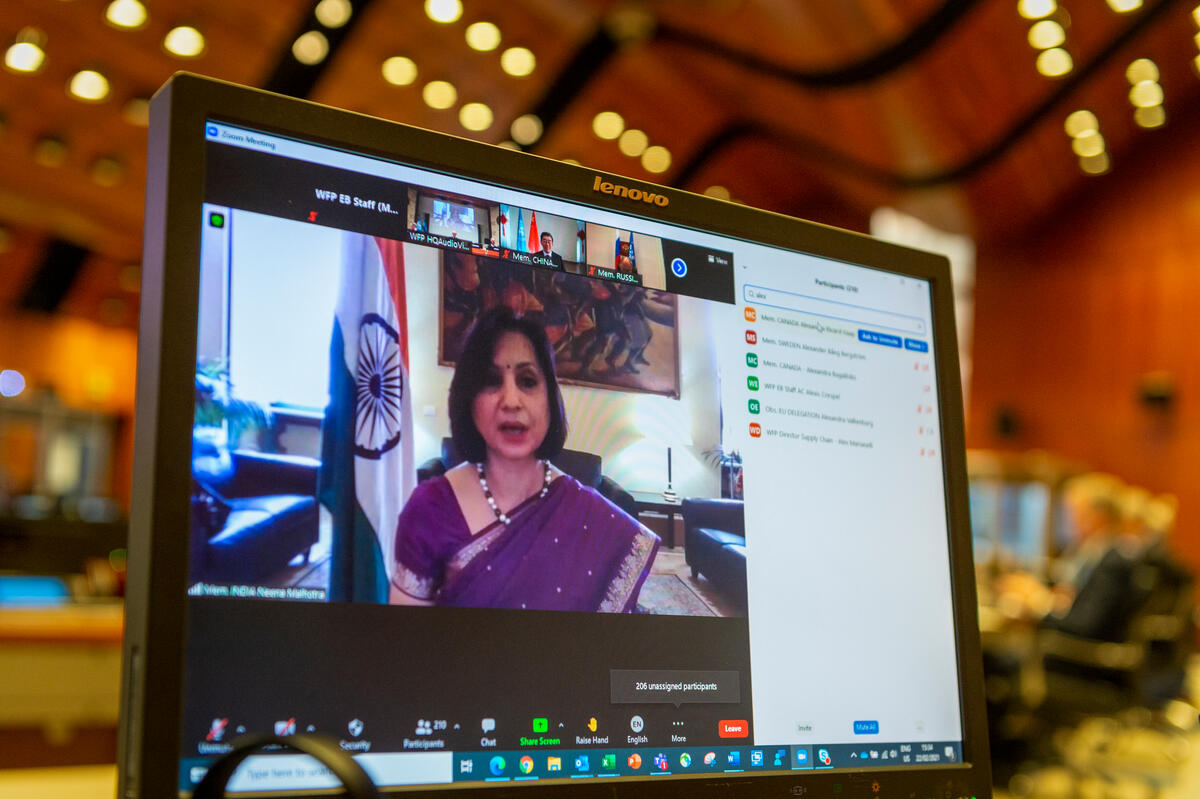 India Permanent Representative connected remotely. Photo: WFP/Giulio d'Adamo
India Permanent Representative connected remotely. Photo: WFP/Giulio d'Adamo
Election of the Bureau and appointment of the Rapporteur
Pursuant to the WFP’s Rules and Regulations, the Executive Board elected the members of the 2021 EB Bureau. His Excellency Luis Fernando Carranza Cifuentes, Ambassador and Permanent Representative of Guatemala, was nominated as President and Dr. Rajender Bommakanti, Alternative Permanent Representative of India as Vice-President.
H.E. Carranza Cifuentes emphasized priority areas of focus during his presidency including the adoption of the people policy which aims to change WFP’s workplace culture and transform it into a more efficient management and leadership able to reinforce core values, principles and standards across the Organization, WFP’s engagement in preparations of the Food Systems Summit to help achieve the Sustainable Development Goals and the Strategic Plan that is up for approval at the November session and will guide the organization from 2022 - 2026.
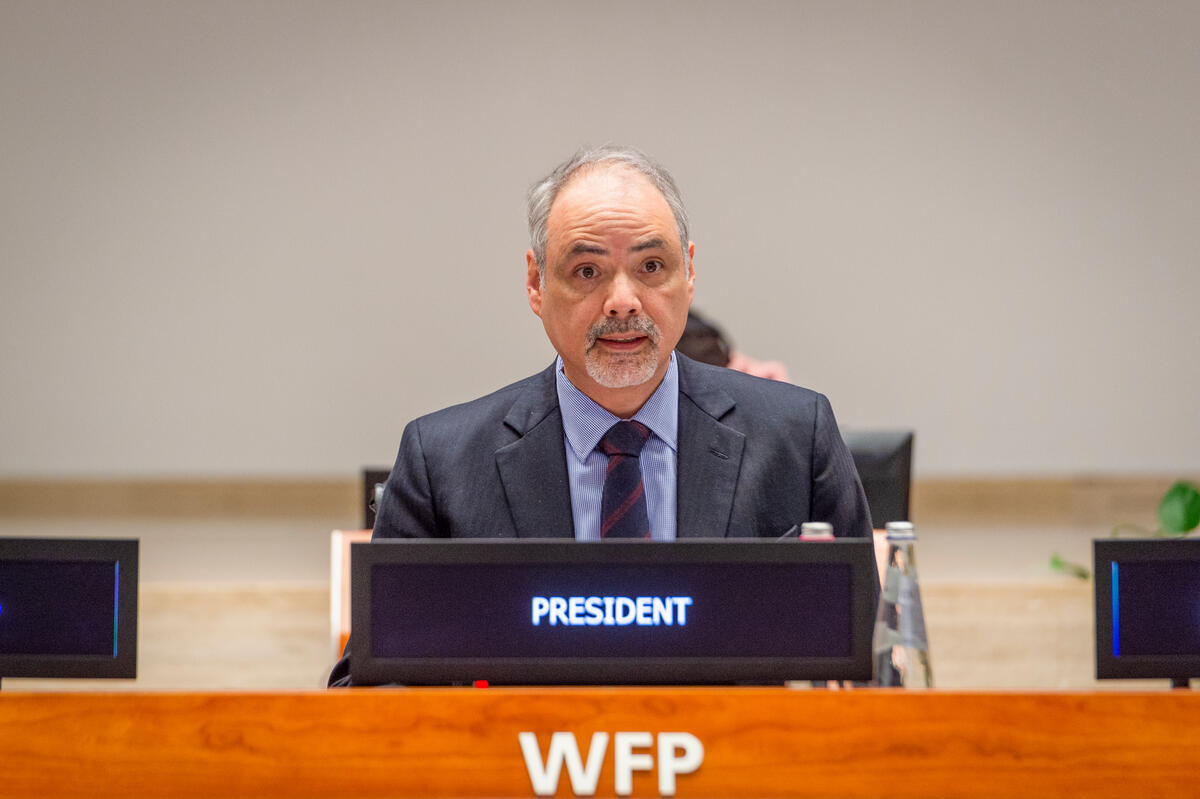 Ambassador H.E. Mr. Luis Fernando Carranza Cifuentes, Guatemala. President of the WFP Executive Board 2021. Photo: WFP/Giulio d'Adamo
Ambassador H.E. Mr. Luis Fernando Carranza Cifuentes, Guatemala. President of the WFP Executive Board 2021. Photo: WFP/Giulio d'Adamo
Opening remarks by the Executive Director
In his opening speech, the Executive Director David Beasley remarked that, due to COVID-19, the number of people on the brink of starvation has spiked to 270 million from 135 million and WFP needs about USD15 billion to achieve its goals to avert famine, destabilization and mass migration in 2021.
Beasley emphasized the importance of breaking down the silos and continue working through the humanitarian-development-peace nexus approach to be able to “move from recipient-based assistance to sustaining livelihoods bringing long-term peace, stability, sustainable economic development in nations around the world”.
The ED added that a people-centred workplace culture will be one of the pillars of WFP’s future. “We want to make certain that every single person working at the World Food Programme is respected as a brother and a sister, as a family”. On this point he also raised concern on vaccine availability: “we have an obligation to make certain that each and every one of those that are working with massive amounts of people get the vaccines that they need so that they can stay healthy”.
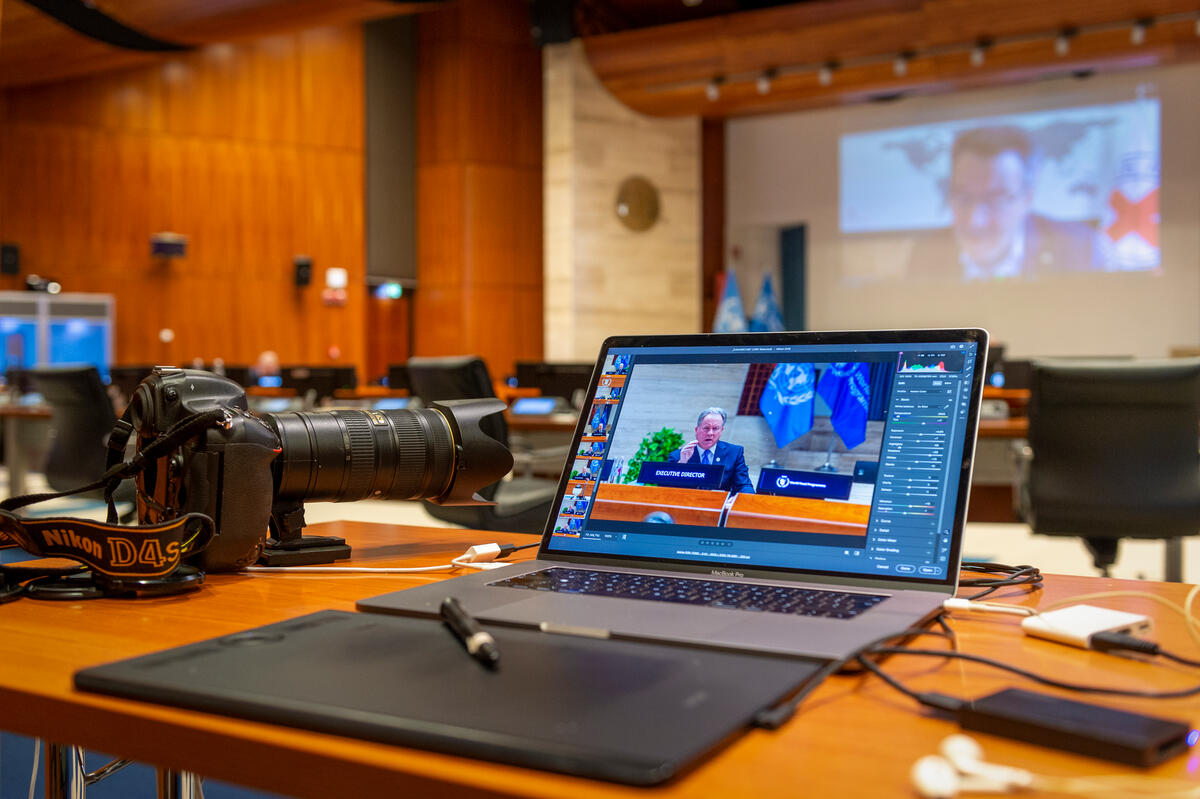 David Beasley, WFP Executive Director; Peter Maurer, President of the International Committee of the Red Cross (ICRC) connected remotely. Photo: WFP/Giulio d'Adamo
David Beasley, WFP Executive Director; Peter Maurer, President of the International Committee of the Red Cross (ICRC) connected remotely. Photo: WFP/Giulio d'Adamo
Special Guest segment
The inaugural session featured opening remarks by special guest, Mr Peter Maurer, President of the International Committee of the Red Cross (ICRC).
The ICRC President highlighted the importance of having “fluid and cooperative arrangements” among humanitarian organizations and thanked the WFP Executive Director and the Board for steering towards the great cooperation between the International Committee of the Red Cross and the World Food Programme. “We help each other, and we complement each other” he observed. “In very fragile contexts we see converging trends coming together, explore complementarities and work together very efficiently”.
Peter Maurer reported that today armed violence and the fragmentation and proliferation of conflict actors are at the backdrop of what drives instability. A rising number of non-state armed groups have emerged in the last years and this implies that about 60 to 80 million people live outside the reach of state services and are in need of humanitarian assistance and protection.
According to Maurer the global pandemic has been “an accelerating force on top of existing fragility”. A shift in focus towards COVID-19 has led to the neglect of other existing health issues – for example childhood vaccinations, chronic diseases or mental health treatment – and caused a crisis of protection as “millions of children have dropped out of school, domestic violence has surged, displaced people have found themselves stranded by closed borders, attacks on healthcare continues”.
In addition, vaccine nationalism and the failure to include vulnerable groups in national plans as well as the failure to have finance for humanitarian buffer within COVAX and similar initiatives are other matters of concern for the President of ICRC.
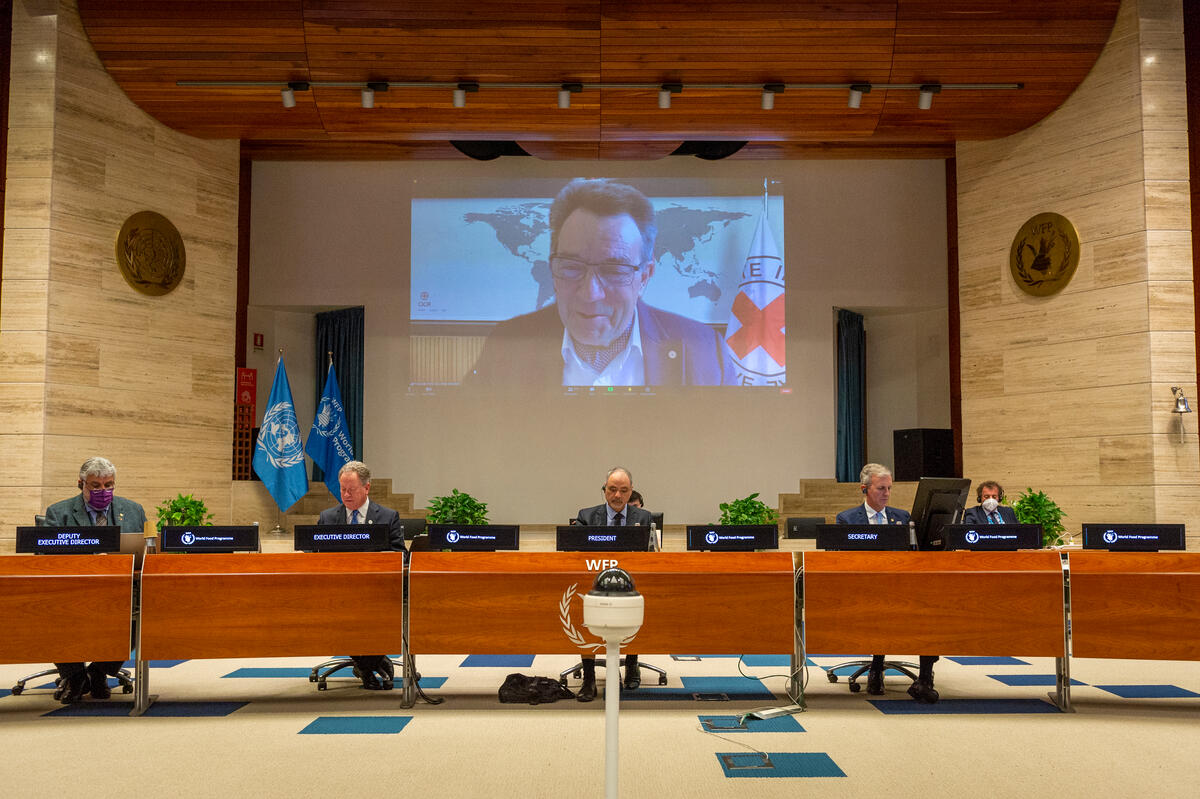 Peter Maurer, President of the International Committee of the Red Cross (ICRC) connected remotely; Amir Mahmoud Abdulla, WFP Deputy Executive Director (1st from left); David Beasley, WFP Executive Director (2nd from left); Ambassador H.E. Mr. Luis Fernando Carranza Cifuentes, Guatemala. President of the WFP Executive Board 2021 (center); Philip Ward, Secretary to the Executive Board (1st from right). Photo: WFP/Giulio d'Adamo
Peter Maurer, President of the International Committee of the Red Cross (ICRC) connected remotely; Amir Mahmoud Abdulla, WFP Deputy Executive Director (1st from left); David Beasley, WFP Executive Director (2nd from left); Ambassador H.E. Mr. Luis Fernando Carranza Cifuentes, Guatemala. President of the WFP Executive Board 2021 (center); Philip Ward, Secretary to the Executive Board (1st from right). Photo: WFP/Giulio d'Adamo
On Monday afternoon, the Executive Director briefed the Board on the tragic news of the attack that occurred in the morning in the Democratic Republic of the Congo, that killed a WFP driver, the Italian Ambassador to the Congo and his bodyguard in their line of duty. The Board President invited the Membership to observe a minute of silence in honour of the victims of this heinous act of violence. Many Permanent Representatives expressed their condolences and solidarity before delivering their national statements.
Key documents
The main documents approved at this session include Colombia country strategic plan (2021-2024), Appointment of five members from the Electoral Lists of the Executive Board to the selection panel for the appointment of Audit Committee members and Extension of the term of one Audit Committee member for one year.
Among the documents for consideration and for information, Summary report on the evaluation of the country strategic plan for Bangladesh (2017–2020) along with management response, Update on WFP’s implementation of United Nations General Assembly resolution 72/279 (repositioning the United Nations development system), Update on the bottom up strategic budgeting exercise and Update on operational requirements and funding forecast for 2021.
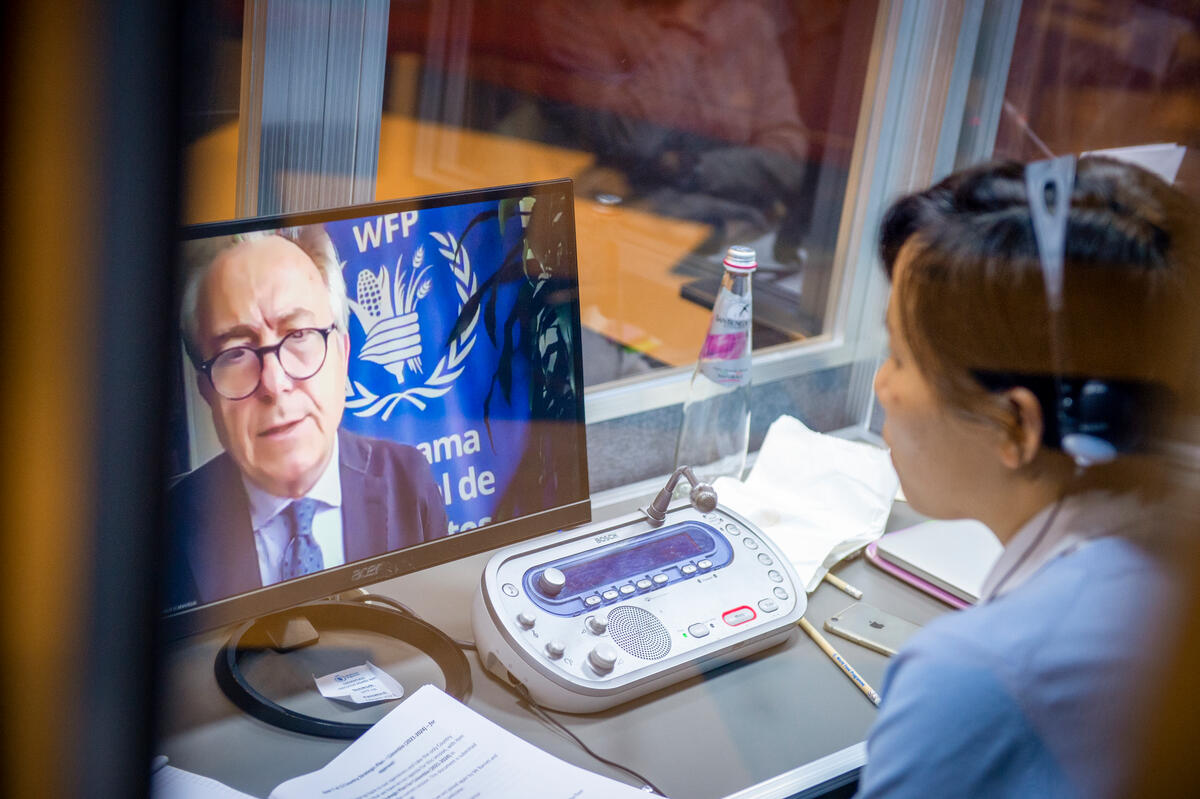 Interpreter at work during the intervention by Carlo Scaramella, Country Director Colombia. Photo: WFP/Giulio d'Adamo
Interpreter at work during the intervention by Carlo Scaramella, Country Director Colombia. Photo: WFP/Giulio d'Adamo
Side events
There were three virtual side events for this board session.
On Tuesday, 23 February, there was an event on Celebrating Humanitarian and Development Innovations at Scale for Zero Hunger across the United Nations sponsored by the Government of Germany. The event showcased the work of the Innovation Accelerator, and how it sources, supports and scales high-potential solutions to end hunger worldwide. Among the projects presented, “EMPACT" a tool providing digital skills to young refugees and host communities; “Autonomous Humanitarian Emergency Aid Devices” (AHEAD) developing remote-controlled trucks to safely bring aid supplies to their destination in partnership with German Aerospace Centre; “Building Blocks” leveraging blockchain to coordinate with other humanitarian agencies and transfer cash assistance to refugees securely and efficiently.
On Wednesday, 24 February, two side events were held in the afternoon.
During the Celebrating the 6th African Day of School Feeding and the Launch of the State of School Feeding Worldwide 2020 Report event chaired by Carmen Burbano, Director, School Based Programmes, Prof. Donald Bundy, London School of Hygiene and Tropical Medicine, University of London, Ms Stefania Giannini, Assistant Director-General for Education, UNESCO and Mr Robert Jenkins, Chief, Education and Associate Director, Programme Division, UNICEF presented the State of School Feeding Worldwide 2020 Report. The segment was also an opportunity to review the state of school feeding in Africa and kick off the campaign to build a global school feeding coalition that shall be formally launched at the United Nations Food Systems Summit later in the year.
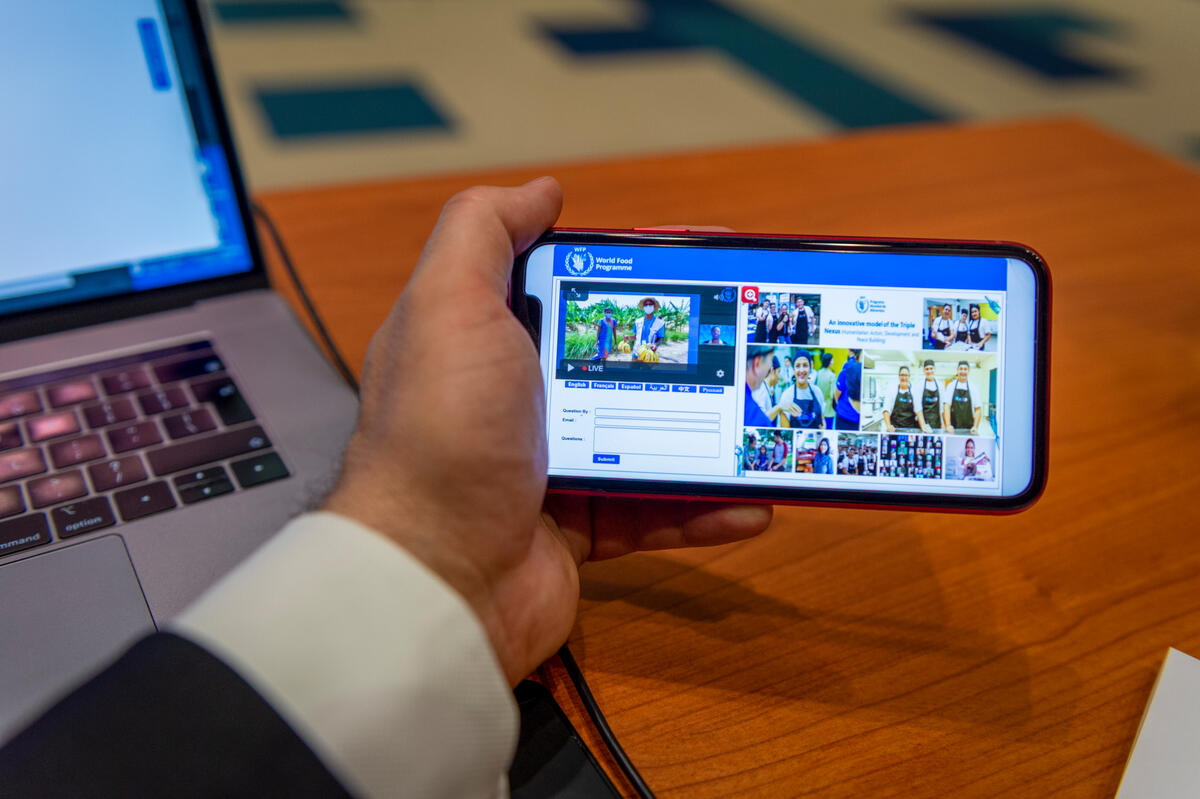 Jacqueline Chinoera, Programme Policy Officer, WFP Zimbabwe (connected remotely). – Side event: WFP’s approaches to building and measuring resilience capacities. Photo: WFP/Giulio d'Adamo
Jacqueline Chinoera, Programme Policy Officer, WFP Zimbabwe (connected remotely). – Side event: WFP’s approaches to building and measuring resilience capacities. Photo: WFP/Giulio d'Adamo
During the session on WFP's approaches to building resilience capacities - examples from the field the Permanent Representatives were presented six integrated resilience approaches in response to different shocks and stressors in development and emergency settings: Somalia, Zimbabwe, El Salvador, Niger, Kenya and the Philippines WFP country offices. Field presentations provided by the respective country Directors were followed by a Q&A session facilitated by a panel composed by Mr David Kaatrud, WFP Director, Programme – Humanitarian and Development Division, Dr Jonas Heirman, Evaluation Officer (Impact Evaluation), OEV, Mr Ronald Tran Ba Huy, WFP Deputy Director, Research, Assessment and Monitoring Division/ (RAM); and Mr Oscar Ekdahl, Programme Policy Officer (Head of Resilience), Regional Bureau Cairo and Working Group chair.
Documents, supplementary information and transcripts
Click here to review documents, supplementary information, material from the side events, exhibitions and demos, and view the photo gallery and videos. You may also consult decisions and recommendations and transcripts with detailed record of the discussions.


